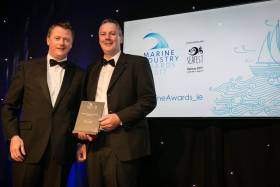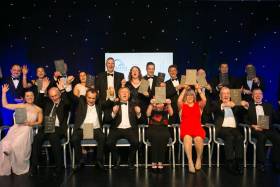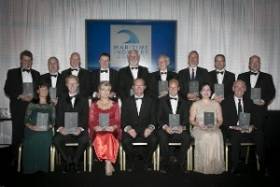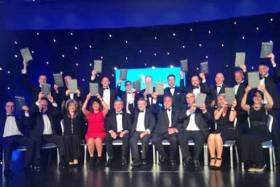Displaying items by tag: Marine Industry Awards
#ShannonEstuary - Shannon Foynes Port Company was announced as the winner of Ports & Harbours Operator of the Year at the Marine Industry Awards 2017.
In the third annual hosting of the event (click here), SFPC – which oversees commercial navigation on the Shannon Estuary and is Ireland’s largest bulk port company - took the top award for ports for the first time. The win, which was announced at the awards in Galway, is a further endorsement of the success of the company, which has achieved remarkable growth year on year since 2011.
The award winners are selected by an independent panel of recognised and expert judges, representing Ireland's marine sector.
Speaking after receiving the award, SFPC CEO Pat Keating said it was validation of the collective efforts of the team. “We’re delighted as this is an endorsement of the efforts being made by the company over recent years. We have really turned the business around since the downturn and today SFPC is one of the key contributors to the regional economy.
“Last year we had growth of 11.4% in year on year tonnages at our general cargo terminals, bringing us close to peak tonnages of the boom and delivering double digit growth for the second successive year. This award very much recognises those gains.
“It also recognises the ambition of the company, backed up by a capital expenditure programme by us and our customers that has seen €40m spent at Foynes alone over the past three years.”
SFPC facilitates trade valued at €7.6bn per annum, with an economic impact arising from this of €1.9bn – equivalent to 1% of Ireland’s entire GDP – and supports 3,372 jobs in the regional economy.
The company’s ambitious plan, Vision 2041, is focussed on helping to transform the estuary into an international economic hub by taking advantage of what are among the deepest and sheltered harbours in Europe & the world.
Winners of the Marine Industry Awards 2017
#MarineAwards - The winners of The Marine Industry Awards 2017 were revealed at the gala awards ceremony which took place as part of SeaFest in Galway.
In total 16 categories were announced at the premier event in Ireland for showcasing on a national scale the outstanding excellence and innovation in Ireland's marine sector. This was the third such year that the annual event has been held.
As for the winner of the prestigious Marine Industry Leader 2017, Sean O’Donoghue was the worthy recipient of the trophy. The award sponsored by the National Maritime College of Ireland, is in recognition of his outstanding contribution to the growth of the marine industry in Ireland.
A graduate of Civil Engineering from University College, Cork, Sean has been the CEO of Killybegs Fishermen’s Organisation since 2000. He has a long and established career in fisheries management and has worked across a wide array of areas such as the Department of Agriculture, Food and the Marine and state seafood agency, Bord Iascaigh Mhara.
Below are the winners of each of the categories representing what is best in the Marine Industry in Ireland.
Overall Marine Excellence Award
Sponsored by Marine Institute
Gavin & Doherty Geosolutions
Marine Industry Leader 2017
Sponsored by National Maritime College of Ireland
Sean O’Donoghue
Ports & Harbours Operator of the Year
Sponsored by PwC
Shannon Foynes Port Company
Shipping Company of the Year
Sponsored by Irish Maritime Development Office
Atlantic Towage & Marine
Excellence in Marine Renewable Energy Award
Lir National Ocean Test Facility
Seafood Sustainability Award
Burren Smokehouse
Seafood Business Innovation Award
Sponsored by BIM
Keohane Seafoods
Aquaculture Company of the Year
Sponsored by BIM
Mulroy Bay Mussels
Marine Tourism & Leisure Operator of the Year
Sea Synergy Marine Awareness & Activity Centre
Special Recognition Award
Capt. Viv Gough
Offshore Ireland Award
Sponsored by SEFtec Group
Woodside
Excellence in Marine Safety Award
SAMS Solutions - CH Marine
Excellence in Marine Research Award
Sponsored by Marine Ireland
MaREI Centre for Marine and Renewable Energy
The Digital Ocean Achievement Award
TechWorks Marine
Excellence in Marine Technology Award
Sponsored by Marine Institute
SafeTrx - 8 West Consulting
Excellence in Marine Education & Training Award
National Maritime College of Ireland
Future Achiever Award
Sponsored by MaREI
Sean Harrington - Atlantic Towage & Marine
Excellence in the Provision of Professional Services to the Marine Industry
Gavin & Doherty Geosolutions
Marine Industry Supplier of the Year
Swan Net Gundry
Entries Open for Marine Industry Awards
#MarineAwards - The Marine Industry Awards are Ireland's premier event to showcase on a national scale excellence and innovation within our marine sector.
Now in the third year, the Awards are a significant event which will be held during SeaFest in Galway. The Awards ceremony takes place on Thursday, June 29th at the Radisson Blu Galway.
The Awards offers a unique opportunity to celebrate industry excellence and network with its most distinguished figures and leading organisations.
Of the 15 categories open for entries, the Marine Industry Awards offer companies an excellent opportunity to showcase the diversity of the marine sector, and the role of companies operating within it. Winners will be selected by an esteemed panel of judges comprising of well-respected professionals and experts across all areas of the marine industry.
So to considering entering your company, entries are now open until April 12th, to apply click online here.
Below are the list of the 15 Marine Industry categories.
Overall Marine Excellence Award
Marine Industry Leader 2017
Future Achiever Award
Ports & Harbours Operator of the Year – Large
Ports & Harbours Operator of the Year – Small
Ship Operator of the Year
Offshore Ireland Award
Marine Tourism & Leisure Operator of the Year
Marine Industry Supplier of the Year
Seafood Business Innovation Award
Seafood Sustainability Award
Excellence in Marine Renewable Energy Award
Excellence in Marine Safety Award
Excellence in Marine Technology Award
Excellence in Marine Education & Training Award
Excellence in Marine Research Award
Excellence in the Provision of Professional Services to the Marine Industry
In addition to assist in making an application for a category, click this PDF Entry Guide booklet here.
Shipping Review: Reduced Exposure on Brexit, Marine Industry Awards & Port Volumes Rise
#ShippingReview - Jehan Ashmore reviews the shipping scene and of the following stories among the last fortnight.
Enterprise Ireland are to seek its clients to be less reliant on UK markets following Brexit, this is to reduce exports by about 7% over the next five years.
Bad news for Irish exporters into the UK as imports will decline as foreign products become more expensive due to weakening sterling, ratings agency Fitch has warned.
At the second annual Marine Industry Awards, held in Galway, Dr Dave Jackson of the Marine Institute was named as Marine Industry Leader for 2016.
After 15 years the European Commission, Council and Parliament have agreed on Port Regulation, a legal framework for organising port services and financial transparency for ports.
Following completion of a series of three freight train trials will enable Irish Rail to increase loads by 50%.
CSO figures reveal an increase in Irish port volumes that handled 50.7 million tonnes of goods in 2015, an increase of 3.2 million tonnes (+6.7%) when compared to 2014.
Marine Industry Awards Recognise Excellence
#MarineAwards - The second annual Marine Industry Awards, hosted last night (Thursday 30 June) at the Radisson Blu Galway, saw Dr Dave Jackson of the Marine Institute named as Marine Industry Leader for 2016.
The Marine Institute was proud to sponsor four prestigious awards at last night's ceremony, held to coincide with SeaFest in the City of the Tribes.
These included the Excellence in Marine Technology Award, which went to Seagull Buoys – JFC Manufacturing, and the Excellence in Marine Education and Training Award presented to the Strategic Marine Alliance for Research and Training (SMART).
The Excellence in Marine Research Award went to the Coastal/Ocean Observing System, NUI Galway, while the award for Excellence in the Provision of Professional Services to the Marine Industry, sponsored by the Irish Maritime Development Office, went to GAC Training and Service Solutions.
Marin eMinister Michael Creed and Marine Institute chief executive Dr Peter Heffernan commended all the awardees on their success.
On Dr Jackson's award, Dr Heffernan said: "This award is a tremendous recognition of the significant role Dave has played in the development of the aquaculture industry both in Ireland and on an international level.
"I would like to personally acknowledge this achievement as a reflection of his career spanning over 30 years, dedicated to the advancement and expansion of the aquaculture industry."
The event was hosted by comic and broadcaster Colm O'Regan, with 19 prestigious trophies presented to the very best leaders and organisations operating across Ireland's marine industry.
According to the organisers, the Marine Industry Awards provide a voice for the individuals and companies that play a significant role in the growth and development of the industry in Ireland while recognising the key functions within the industry that promote growth and sustainability including manufacturing, port operations, logistics and commercial excellence to innovation, tourism and leisure, sustainability, aquaculture, education as well as many others.
Galway To Host Marine Industry Awards This June
#MarineIndustryAwards - The Marine Industry Awards 2016 will take place at the Radisson Blu Galway in association with SeaFest, Ireland's national maritime festival, on Thursday 30 June.
Debuting in Dublin last year as the Maritime Industry Awards, the ceremony has been revamped to greater encompass all aspects of the maritime and marine sectors, and celebrate their contribution to the Irish economy.
The Marine Industry Awards provide a voice for the individuals and companies that play a significant role in the growth and development of the industry in Ireland while recognising the key functions within the industry that promote growth and sustainability.
The deadline for entries at 5pm next Friday 22 April is fast approaching – with award categories ranging from manufacturing, port operations, logistics & commercial excellence to innovation, tourism & leisure, sustainability, aquaculture, education as well as many others.
National Maritime College of Ireland head Conor Mowlds chairs a judging panel that includes a number of names returning from last year's awards:
- Liam Lacy, director, Irish Maritime Development Office (IMDO) Shipping Industry
- Donal Maguire, Bord Iascaigh Mhara
- Dermot Clohessy, Marine Institute
- Dr Margaret Rae, Marine Institute
- Lorcan O’Cinnéide, Irish Fish Processors
- Prof Patrick Shannon, Irish Offshore Operators’ Association
- Yvonne Shields, Chartered Institute of Logistics & Transport
- Declan Meally, SEAI
- Dave Ronayne, Mainport
- Robert Dix, KPMG
For more details visit the Marine Industry Awards website HERE.


































































